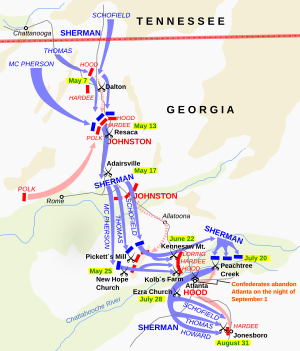Charles D. Anderson facts for kids
Quick facts for kids
Charles David Anderson
|
|
|---|---|
| Born | May 22, 1827 DeKalb County, Georgia |
| Died | February 22, 1901 (aged 73) Fort Valley, Georgia |
| Place of burial |
Oak Lawn Cemetery in Fort Valley
|
| Allegiance | |
| Service/ |
|
| Years of service | 1861–65 |
| Rank | |
| Unit | |
| Commands held | 3rd Georgia Militia Brigade |
| Battles/wars | American Civil War |
Charles David Anderson (born May 22, 1827 – died February 22, 1901) was an important American figure. He was a farmer, a businessman, and a lawmaker. He also served as a soldier. During the American Civil War, he was an officer in the Confederate States Army. He was hurt three times in battles. After the war, Anderson worked as a tax collector in Georgia.
Contents
Charles David Anderson's Early Life and Work
Charles D. Anderson was born in 1827. His birthplace was near Stone Mountain in DeKalb County, Georgia. His father, William Robert Anderson, was a farmer. William's father had been an officer in the American Revolution. Charles Anderson lived in Fort Valley in Houston County. There, he worked as a farmer and a cotton merchant. Before the Civil War, he was a judge in Houston County from 1857 to 1858. He also served as the mayor of Fort Valley.
Charles Anderson's Civil War Service
When the American Civil War started in 1861, Charles Anderson chose to support his home state of Georgia. He joined the Confederate side.
Joining the 6th Georgia Infantry
On May 27, 1861, he was chosen as a captain in the 6th Georgia Infantry. He was put in charge of Company C. In October of that year, he led troops guarding Choctaw and Owen Bluffs in Alabama.
Battles and Injuries
Anderson fought in the Maryland Campaign in the fall of 1862. He was part of the Battle of Antietam on September 17. During this battle, he was wounded and captured by Union soldiers. He was later exchanged and released that same year. After his release, Anderson was promoted to major. This promotion was made official from the date of the Battle of Antietam. In December 1862, he also took part in the Fredericksburg Campaign.
In 1863, Anderson fought in the Chancellorsville Campaign. He was seriously wounded on May 3. He was hit in his shoulder, stomach, and left hand. He even lost a finger. On May 15, Anderson was promoted to lieutenant colonel. But because of his injuries, he left the Confederate Army on January 20, 1864. When he returned to Georgia, he became an aide-de-camp (a special assistant) to Gov. Joseph E. Brown.

Leading Militia Forces
In the summer of 1864, Anderson was made a colonel of the 5th Georgia Militia. By May, he was promoted to brigadier general. He was given command of the 3rd Georgia Militia Brigade. His troops were sent to help the Army of Tennessee after the Battle of Kennesaw Mountain in late June. They served for the rest of the Atlanta Campaign.
On July 22, during the Battle of Atlanta, Anderson's group was only lightly involved. When Atlanta fell, the militia forces left the Army of Tennessee. They then served during Sherman's March to the Sea that winter. Anderson was part of the Confederate attack in the Battle of Griswoldville on November 22. In this battle, his clothes were shot many times, and his horse was shot from under him. He was known for his calm and precise actions in that difficult fight. Anderson was wounded again in this battle.
Anderson and his troops were part of the group defending Savannah, Georgia, in December 1864. After Savannah surrendered, his militia brigade was sent to Augusta. His last job was to defend Macon. Even though he was still fighting, Anderson had been elected to Georgia's state senate in late 1863. His term ended in 1865 when the war finished. He had also been officially released from the volunteer Confederate forces in January.
After the War Ended
After the war, Anderson stayed in Macon. He ran a cotton warehouse and a farm supply business. The U.S. Government pardoned him on September 25, 1865. When these businesses did not succeed, he went back to Fort Valley, Georgia. There, he became the tax collector for Houston County. Charles David Anderson died in Fort Valley in 1901. He was buried in the city's Oak Lawn Cemetery.
 | Jessica Watkins |
 | Robert Henry Lawrence Jr. |
 | Mae Jemison |
 | Sian Proctor |
 | Guion Bluford |

